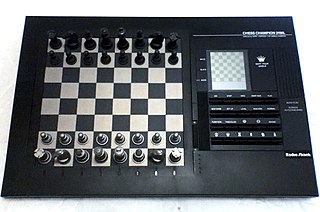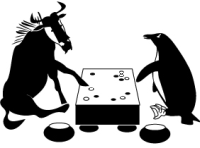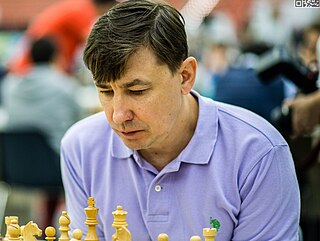Related Research Articles

Computer chess includes both hardware and software capable of playing chess. Computer chess provides opportunities for players to practice even in the absence of human opponents, and also provides opportunities for analysis, entertainment and training. Computer chess applications that play at the level of a chess grandmaster or higher are available on hardware from supercomputers to smart phones. Standalone chess-playing machines are also available. Stockfish, Leela Chess Zero, GNU Chess, Fruit, and other free open source applications are available for various platforms.

Vladimir Borisovich Kramnik is a Russian chess grandmaster. He was the Classical World Chess Champion from 2000 to 2006, and the 14th undisputed World Chess Champion from 2006 to 2007. He has won three team gold medals and three individual medals at Chess Olympiads.

GNU Chess is a free software chess engine and command-line interface chessboard. The goal of GNU Chess is to serve as a basis for research, and as such it has been used in numerous contexts.
ChessBase is a German company that develops and sells chess software, maintains a chess news site, and operates an internet chess server for online chess. Founded in 1986, it maintains and sells large-scale databases containing the moves of recorded chess games. The databases contain data from prior games and provide engine analyses of games. Endgame tablebases are also provided by the company.

GNU Go is a free software program by the Free Software Foundation that plays Go. Its source code is quite portable, and can be easily compiled for Linux, as well as other Unix-like systems, Microsoft Windows and macOS; ports exist for other platforms.

In computer chess, a chess engine is a computer program that analyzes chess or chess variant positions, and generates a move or list of moves that it regards as strongest.

HIARCS is a proprietary UCI chess engine developed by Mark Uniacke. Its name is an acronym standing for higher intelligence auto-response chess system. Because Hiarcs is written portable in C, it is available on multiple platforms such as Pocket PC, Palm OS, PDAs, iOS, Microsoft Windows and Mac OS X.
Backward chaining is an inference method described colloquially as working backward from the goal. It is used in automated theorem provers, inference engines, proof assistants, and other artificial intelligence applications.
World Computer Chess Championship (WCCC) is an event held periodically since 1974 where computer chess engines compete against each other. The event is organized by the International Computer Games Association. It is often held in conjunction with the World Computer Speed Chess Championship and the Computer Olympiad, a collection of computer tournaments for other board games. Instead of using engine protocols, the games are played on physical boards by human operators.

Fritz is a German chess program originally developed for Chessbase by Frans Morsch based on his Quest program, ported to DOS, and then Windows by Mathias Feist. With version 13, Morsch retired, and his engine was first replaced by Gyula Horvath's Pandix, and then with Fritz 15, Vasik Rajlich's Rybka.

Evgeny Ilgizovich Bareev is a Russian-Canadian chess player, trainer, and writer. Awarded the FIDE Grandmaster title in 1989, he was ranked fourth in the world in the international rankings in 1992 and again in 2003, with an Elo rating of 2739.

Rybka is a computer chess engine designed by International Master Vasik Rajlich. Around 2011, Rybka was one of the top-rated engines on chess engine rating lists and won many computer chess tournaments.
Cheating in chess is a deliberate violation of the rules of chess or other behaviour that is intended to give an unfair advantage to a player or team. Cheating can occur in many forms and can take place before, during, or after a game. Commonly cited instances of cheating include: collusion with spectators or other players, use of chess engines during play, rating manipulation, and violations of the touch-move rule. Many suspiciously motivated practices are not comprehensively covered by the rules of chess.
This article documents the progress of significant human–computer chess matches.
A chess rating system is a system used in chess to estimate the strength of a player, based on their performance versus other players. They are used by organizations such as FIDE, the US Chess Federation, International Correspondence Chess Federation, and the English Chess Federation. Most of the systems are used to recalculate ratings after a tournament or match but some are used to recalculate ratings after individual games. Popular online chess sites such as Chess.com, Lichess, and Internet Chess Club also implement rating systems. In almost all systems, a higher number indicates a stronger player. In general, players' ratings go up if they perform better than expected and down if they perform worse than expected. The magnitude of the change depends on the rating of their opponents. The Elo rating system is currently the most widely used. The Elo-like ratings systems have been adopted in many other contexts, such as other games like Go, in online competitive gaming, and in dating apps.
ChessGenius is the name of a chess-playing computer program written by Richard Lang who has in the past written programs that have won the World Computer Chess Championship on 10 occasions.

Stockfish is a free and open-source chess engine, available for various desktop and mobile platforms. It can be used in chess software through the Universal Chess Interface.

Komodo and Dragon by Komodo Chess are UCI chess engines developed by Komodo Chess, which is a part of Chess.com. The engines were originally authored by Don Dailey and GM Larry Kaufman. Dragon is a commercial chess engine, but Komodo is free for non-commercial use. Dragon is consistently ranked near the top of most major chess engine rating lists, along with Stockfish and Leela Chess Zero.
Top Chess Engine Championship, formerly known as Thoresen Chess Engines Competition, is a computer chess tournament that has been run since 2010. It was organized, directed, and hosted by Martin Thoresen until the end of Season 6; from Season 7 onward it has been organized by Chessdom. It is often regarded as the Unofficial World Computer Chess Championship because of its strong participant line-up and long time-control matches on high-end hardware, giving rise to very high-class chess. The tournament has attracted nearly all the top engines compared to the World Computer Chess Championship.
References
- ↑ "Pocket Fritz" . Retrieved 2019-08-27.
- ↑ "Pocket Fritz 2" . Retrieved 2019-08-27.
- ↑ [ dead link ]
- ↑ "Pocket Fritz 3 uses Hiarcs!! and gets a GM Norm :)" . Retrieved 2019-08-27.
- ↑ "Humans v. Computers In Chess" . Retrieved 2019-08-27.
- ↑ "The Week in Chess 771". Archived from the original on 2011-09-30. Retrieved 2010-04-03.